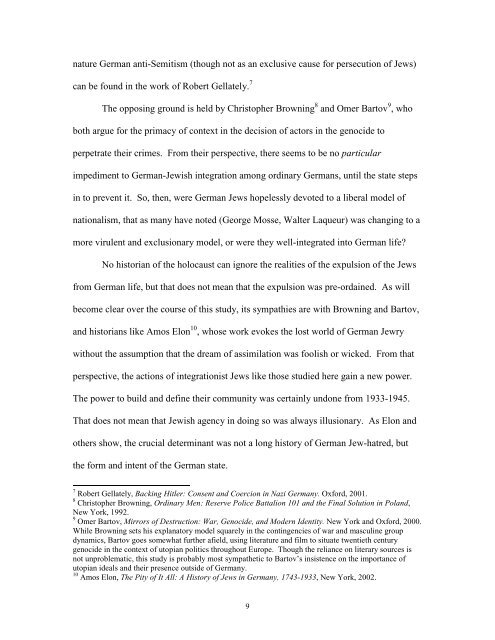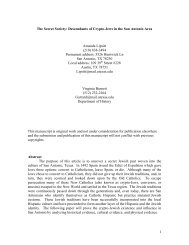Jews in Leipzig - The University of Texas at Austin
Jews in Leipzig - The University of Texas at Austin
Jews in Leipzig - The University of Texas at Austin
Create successful ePaper yourself
Turn your PDF publications into a flip-book with our unique Google optimized e-Paper software.
n<strong>at</strong>ure German anti-Semitism (though not as an exclusive cause for persecution <strong>of</strong> <strong>Jews</strong>)<br />
can be found <strong>in</strong> the work <strong>of</strong> Robert Gell<strong>at</strong>ely. 7<br />
<strong>The</strong> oppos<strong>in</strong>g ground is held by Christopher Brown<strong>in</strong>g 8 and Omer Bartov 9 , who<br />
both argue for the primacy <strong>of</strong> context <strong>in</strong> the decision <strong>of</strong> actors <strong>in</strong> the genocide to<br />
perpetr<strong>at</strong>e their crimes. From their perspective, there seems to be no particular<br />
impediment to German-Jewish <strong>in</strong>tegr<strong>at</strong>ion among ord<strong>in</strong>ary Germans, until the st<strong>at</strong>e steps<br />
<strong>in</strong> to prevent it. So, then, were German <strong>Jews</strong> hopelessly devoted to a liberal model <strong>of</strong><br />
n<strong>at</strong>ionalism, th<strong>at</strong> as many have noted (George Mosse, Walter Laqueur) was chang<strong>in</strong>g to a<br />
more virulent and exclusionary model, or were they well-<strong>in</strong>tegr<strong>at</strong>ed <strong>in</strong>to German life?<br />
No historian <strong>of</strong> the holocaust can ignore the realities <strong>of</strong> the expulsion <strong>of</strong> the <strong>Jews</strong><br />
from German life, but th<strong>at</strong> does not mean th<strong>at</strong> the expulsion was pre-orda<strong>in</strong>ed. As will<br />
become clear over the course <strong>of</strong> this study, its symp<strong>at</strong>hies are with Brown<strong>in</strong>g and Bartov,<br />
and historians like Amos Elon 10 , whose work evokes the lost world <strong>of</strong> German Jewry<br />
without the assumption th<strong>at</strong> the dream <strong>of</strong> assimil<strong>at</strong>ion was foolish or wicked. From th<strong>at</strong><br />
perspective, the actions <strong>of</strong> <strong>in</strong>tegr<strong>at</strong>ionist <strong>Jews</strong> like those studied here ga<strong>in</strong> a new power.<br />
<strong>The</strong> power to build and def<strong>in</strong>e their community was certa<strong>in</strong>ly undone from 1933-1945.<br />
Th<strong>at</strong> does not mean th<strong>at</strong> Jewish agency <strong>in</strong> do<strong>in</strong>g so was always illusionary. As Elon and<br />
others show, the crucial determ<strong>in</strong>ant was not a long history <strong>of</strong> German Jew-h<strong>at</strong>red, but<br />
the form and <strong>in</strong>tent <strong>of</strong> the German st<strong>at</strong>e.<br />
7<br />
Robert Gell<strong>at</strong>ely, Back<strong>in</strong>g Hitler: Consent and Coercion <strong>in</strong> Nazi Germany. Oxford, 2001.<br />
8<br />
Christopher Brown<strong>in</strong>g, Ord<strong>in</strong>ary Men: Reserve Police B<strong>at</strong>talion 101 and the F<strong>in</strong>al Solution <strong>in</strong> Poland,<br />
New York, 1992.<br />
9<br />
Omer Bartov, Mirrors <strong>of</strong> Destruction: War, Genocide, and Modern Identity. New York and Oxford, 2000.<br />
While Brown<strong>in</strong>g sets his explan<strong>at</strong>ory model squarely <strong>in</strong> the cont<strong>in</strong>gencies <strong>of</strong> war and mascul<strong>in</strong>e group<br />
dynamics, Bartov goes somewh<strong>at</strong> further afield, us<strong>in</strong>g liter<strong>at</strong>ure and film to situ<strong>at</strong>e twentieth century<br />
genocide <strong>in</strong> the context <strong>of</strong> utopian politics throughout Europe. Though the reliance on literary sources is<br />
not unproblem<strong>at</strong>ic, this study is probably most symp<strong>at</strong>hetic to Bartov’s <strong>in</strong>sistence on the importance <strong>of</strong><br />
utopian ideals and their presence outside <strong>of</strong> Germany.<br />
10<br />
Amos Elon, <strong>The</strong> Pity <strong>of</strong> It All: A History <strong>of</strong> <strong>Jews</strong> <strong>in</strong> Germany, 1743-1933, New York, 2002.<br />
9

















